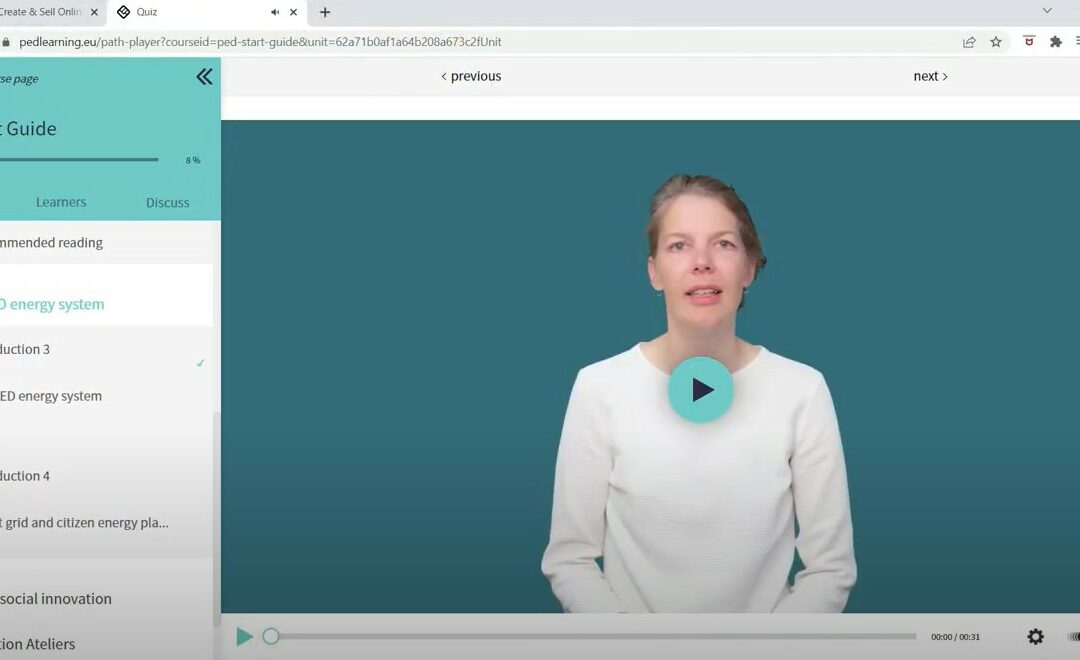By Marije Poel, Amsterdam University of Applied Sciences
Learning is a continuous process in innovation projects. Learning takes place all the time, implicit and explicit. We have the ambition to learn from the realization of the Positive Energy Districts in Amsterdam and Bilbao. To facilitate this, we have developed a Massive Open Online Course (MOOC) making these learnings available. In this blog, I want to share with you the experience of sharing learnings in and from EU projects.
What have we learned so far?
We already have relevant learnings to share:
- Learning is indeed a continuous process: In making this proposal, we’ve studied the possible and theoretical role of positive energy districts in the broader energy transition; In trying to come up with a practical plan to transform of build a neighborhood towards a net positive energy district we learned to apply those theories and concepts.
- By making the learnings explicit, for example in the SCIS PED Booklet, we develop our own thinking about PEDs and that changes also the perspective on the concept of PEDs.
- The local context of these districts, such as culture, policy and regulations, politics, have a lot of influence on the development of a PED in different cities in different countries. So, it’s not a one size fits all but maybe more learning by doing. And a lot more projects and cities are experimenting with PEDs and learning by doing so.
That’s why we changed our strategy about sharing learnings; instead of finishing the project with a MOOC, we decided to already make an introduction module and learn together. We made a first module of the MOOC and want to bring together a community of people involved or interested in PEDs. We now support that with an e-learning platform.
Challenges of sharing learnings
In the further development of the MOOC, we face a couple of challenges. We want the MOOC to support professional learning. Professional learning can be defined as:
Those relevant individual or collaborative opportunities, encounters or experiences that promote enhanced skills, knowledge, capabilities and practices that are situated within an HE (Higher Educated) academic’s own career development and may also meet present and future organisational objectives.[1]
Firstly, an important question for us and the MOOC, is to find out what kind of things are relevant to learn for professionals. And how do people want to learn about PED’s? So we need to define if PED development is about skills, knowledge, capabilities and or practices, and define which ones. And we need to discover how we can transfer or develop those through opportunities, encounters or experiences, in this e-learning platform and beyond.
Secondly, we need to know if we deal with different professionals and different target groups: Does a policy maker in local government have the same learning questions as someone working in the neighbourhood as a community manager or as the developer of the local energy trading platform for people living in the PED? Do we need to make tailor made programs or would it be valuable to join them in an online teaching class, so they learn from each other’s expertise and challenges?
A third challenge is to transfer learnings on complex innovation, as a PED is. Making learning modules, we tend to unravel the complexity by dividing PEDs in different topics: one on the technological energy system, one on stakeholder management, one on finance and business models. But that doesn’t do right to the PED development, because in reality those topics are all related, and interfere. For example, technologies (such as a shared energy system and platform) should be accepted by the users; that is about technological acceptance en social innovation. Therefore you need to learn about both technical, social and psychological theories and concepts and know how those relate (an interdisciplinary approach). I think we should aim for sharing experiences in working in this complexity, making interdependences visible and share also different attempts and failures.
Knowing what you don’t know
I want to end about learning with this note: in the development of educational programs, it’s crucial to define the knowledge gap: what is it that people need to know and need to be able to do after a course or MOOC. But in these kind of innovation projects and innovative subjects as PEDs, is it possible for people to know what they don’t know?
Maybe we all don’t know, but will learn along the way; so let’s just continue sharing learnings together.
[1] Professional Learning: A Definition in Progress, February 10, 2017 Wayne Barry, visited on Jan 18 2022, https://www.waynebarry.com/2017/02/10/professional-learning-a-definition-in-progress/#:~:text=For%20example%2C%20these%20definitions%20have,or%20improvement%20and%20towards%20transformation
